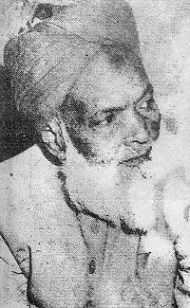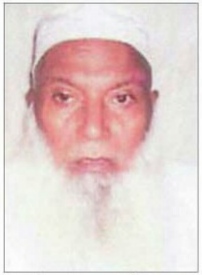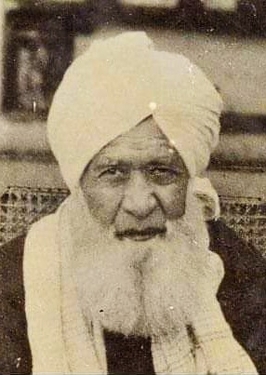Related Research Articles
Manazir Ahsan Gilani was an Indian Sunni Islamic scholar and former Dean of the Faculty of Theology at Osmania University. Some of his notable works include Tadwin-e-Hadith, Muqaddama Tadwin-e-Fiqh, Sawanih-e-Abu Dharr Ghifari, and Sawanih-e-Qasmi. Muhammad Hamidullah, a historian and hadith researcher, was among his students.

Mahmud Hasan Deobandi was an Indian Muslim scholar and an activist of the Indian independence movement, who co-founded the Jamia Millia Islamia University and launched the Silk Letter Movement for the freedom of India. He was the first student to study at the Darul Uloom Deoband seminary. His teachers included Muhammad Qasim Nanawtawi and Mahmud Deobandi, and he was authorized in Sufism by Imdadullah Muhajir Makki and Rashid Ahmad Gangohi.

Muḥammad Shafī‘ ibn Muḥammad Yāsīn ‘Us̱mānī Deobandī, often referred to as Mufti Muhammad Shafi, was a Pakistani Sunni Islamic scholar of the Deobandi school of Islamic thought.

Mazahir Uloom is an Islamic seminary located in Saharanpur, Uttar Pradesh. Started in November 1866 by Sa'ādat Ali Faqīh, and developed further by Mazhar Nanautawi and Ahmad Ali Saharanpuri; it is regarded as the second most influential and major Deobandi seminary in India. The earliest graduates of the seminary include famous Hadīth scholar Khalil Ahmad Saharanpuri. In 1988, the seminary split into two with the establishment of Mazahir Uloom Jadeed as a new independent seminary. Since then the seminary has been named as Mazahir Uloom Waqf Qadeem.
Syed Fakhruddin Ahmad (1889-1972) was an Indian Sunni Muslim scholar and jurist who served as the Principal of Madrasa Shahi, and the sixth President of Jamiat Ulama-e-Hind. He was a professor of hadith at the Darul Uloom Deoband.
Izaz Ali Amrohi was an Indian Islamic scholar who served as the second and ninth Grand Mufti of the Darul Uloom Deoband. His book Nafahtul Arab is taught in madrassas including the Darul Uloom Deoband.

Abdul Haq Azmi was an Indian Islamic scholar who was a senior professor of hadith at the Darul Uloom Deoband. He was an alumnus of Darul Uloom Mau and Darul Uloom Deoband. His students included Mahmood Madani, Mohammad Najeeb Qasmi and Noor Alam Khalil Amini.
Hafiz Muhammad Ahmad (1862–1928) was an Indian Muslim scholar, who served as the vice chancellor of the Darul Uloom Deoband for thirty five years. He was the Grand Mufti of the Hyderabad State from 1922 to 1925.
Salman Mazahiri was an Indian Muslim scholar who served as chancellor of Mazahir Uloom Jadeed.
Aḥmad Alī Sahāranpūrī was an Indian hadith scholar who played a key role in publishing hadīth literature in India. He was among the early teachers of Mazahir Uloom, and is often credited as a founder for his contributions to the development of the seminary. His students include Muhammad Qasim Nanautawi and Shibli Nomani.
Ahmad Hasan Amrohi also known as Muhaddith Amrohi within the Deobandi movement; was an Indian Muslim scholar and freedom struggle activist who served as the first principal of Madrasa Shahi in Moradabad. He was an alumnus of Darul Uloom Deoband and among the founding members of Mahmud Hasan Deobandi's Thamratut-Tarbiyat. He was an authorized disciple of Imdadullah Muhajir Makki.
Deobandi hadith studies is a field of Islamic scholarship within the Deobandi movement that critically examines the sayings and actions of the Islamic prophet Muhammad as recorded in the Hadith literature. The Deobandi approach to Hadith studies is based on the principles of the classical scholars of hadith.
Nematullah Azami, also written as Nematullah Azmi and Ni'matullah Azami, is an Indian Islamic hadith scholar, a commentator on the Quran (mufassir), and a faqīh. He is the president of India's Islamic Fiqh Academy. He has also been serving as a senior lecturer at Darul Uloom Deoband for forty years.

Muhammad Ibrahim Balyawi (1887–1967), also spelt as Muhammad Ibrahim Balliavi, was an Indian Sunni Muslim scholar who served as the 6th Principal of Darul Uloom Deoband. He spent almost 50 years instructing Hadith, Mantiq, Islamic philosophy, and other subjects at Darul Uloom Deoband.
Badre Alam Merathi was a mid-twentieth-century hadith scholar and poet originally from Meerut, initially migrated to Pakistan and eventually settled in Medina. Best known as the interpreter of Anwar Shah Kashmiri's teachings, he was a disciple of both Kashmiri and Shabbir Ahmad Usmani. Educated at Mazahir Uloom and Darul Uloom Deoband, he taught at both institutions and Jamia Islamia Talimuddin. During his tenure at Jamia Islamia Talimuddin, he compiled Fayd al-Bari, a four-volume Arabic commentary on Sahih al-Bukhari, published in Cairo with financial support from Jamiatul Ulama Transvaal, considered a masterpiece in hadith commentary. He was also associated with Nadwatul Musannifeen and authored Tarjuman al-Sunnah, a 4-volume hadith explanation designed for contemporary needs, widely acknowledged in academic circles. In his final years, he focused on teaching hadith in Prophet's Mosque, where many South Africans pledged allegiance to him, expanding his spiritual influence in South Africa.
Naseer Ahmad Khan (1918–2010), also written as Naseer Ahmad Khan Bulandshahri, was an Indian Islamic scholar and muhaddith. He served as a professor at Darul Uloom Deoband for approximately sixty-five years, during which he taught Sahih al-Bukhari for thirty-two years.
Sharif Hasan Deobandi was an Indian Islamic scholar and Muhaddith. He served as Sheikh al-Hadith at Darul Uloom Deoband from 1972 to 1977. He also worked as a professor of Hadith and Sheikh al-Hadith at Jamia Islamia Talimuddin in Dabhel for almost ten years.
Mahdi Hasan Shahjahanpuri (1882–1976), also known as Mufti Mehdi Hasan and Mahdi Hasan Gilani Qadri, was an Indian Islamic scholar and mufti. He served as grand mufti at Darul Uloom Deoband for twenty years. He was an alumnus of Madrasa Aminia and Darul Uloom Deoband. He was a student of Mahmud Hasan Deobandi and Kifayatullah Dehlawi. Along with jurisprudence, he also had access to hadith and biographical evaluation. His literary works include Rijāl-u-Kitāb al-Āthār, Sharh-u-Balāghāt-i-Muhammad Fī Kitāb al-Āthār, Al-la'ali al-Masnoo'ah fī al-Riwāyāti al-Marjoo'ah, and a critical commentary on certain ideas of Ibn Hazm in the Science of Hadith entitled As-Sayf al-mujalla 'ala al-Muḥalla. He has done research and commentary work on Muhammad al-Shaybani's two books, Kitab al-Hujjah Alā Ahl al-Madīnah and Kitab al-Āthār.
Abdullah Maroofi is an Indian Islamic scholar, mufti, and writer who specialises in Hadith studies. Since 2001, he has been serving as a lecturer in the department of specialisation in Hadith at Darul Uloom Deoband and is currently the supervisor of the department.
Habibur Rahman Azami, also written as Habibur Rahman Qasmi Azmi, was an Indian Islamic scholar, writer, and expert in the field of biographical evaluation of hadith narrators. He served as a professor of hadith at Darul Uloom Deoband. He served as the 6th editor-in-chief of Monthly Darul Uloom. He authored several books, including Shuyukh al-Imam Abi Dawud al-Sijistani fī Kitab al-Sunan, Tazkirah Ulama-e-Azamgarh, Ajodhya ke Islami Aathar, and Babri Masjid: Haqaiq aur Afsanay.
References
- ↑ "Community News: Bokhari Shareef reliable book (Nagina)". The Milli Gazette . Retrieved 1 December 2024.
- ↑ Qasmi, Muhammadullah (October 2020). Darul Uloom Deoband Ki Jame O Mukhtasar Tareekh (in Urdu) (3rd ed.). India: Shaikh-Ul-Hind Academy. p. 682. OCLC 1345466013.
- ↑ Muzaffarnagari, Muhammad Taslim Aarifi; Saharanpuri, Abdullah Sher Khan (2023). Asātizat-u-Dar al-Uloom Wa Asānīduhum Fi al-Hadith [Asanīd of Hadith teachers of Darul Uloom] (in Urdu) (2nd ed.). Deoband: Maktaba al-Haramain. p. 56.
- 1 2 Muzaffarnagari & Saharanpuri 2023, p. 56.
- 1 2 3 Qasmi 2020, p. 682.
- ↑ Muzaffarnagari & Saharanpuri 2023, pp. 56–57.
- ↑ Mazahiri, Muhammad Kauthar Ali Subhani (December 2021). Al-Jauhar al-Mufeed Fi Tahqīq al-Asānīd (in Urdu) (1st ed.). Forbesganj, Arria, Bihar: Jamiatul Falah Darul Uloom al-Islamia. p. 517.
- 1 2 Mazahiri 2021, p. 519.
- ↑ Qasmi, Muhammad Islam (October 2019). "Maulana Qamruddin Gorakhpuri". Mere Asātidhah, Meri Darsgāhein, Darakhshān Sitāre (in Urdu). Deoband: Maktabat-un-Noor. pp. 75–76.
- ↑ Muzaffarnagari & Saharanpuri 2023, pp. 57–58.
- 1 2 Mazahiri 2021, p. 517.
- ↑ Rahmani, Jamilur Rahman (1974). Hayāt-e-Fakhrul Islam (in Urdu). Gali Qasim Jan, Old Delhi: Al-Jam'iyyat Book Depot. pp. 107–108.
- ↑ Bharatpuri, Zafaruddin Qasmi (August 2021). Muhafiz-e-Rabbani (in Urdu). Kashmiri Gate, Delhi: Madrasa Abdur Rab. pp. 183–185.
- ↑ Mazahiri 2021, p. 518.
- ↑ Qasmi 2020, p. 767.
- ↑ Mubarakpuri, Arif Jameel (2021). Mausoo'a Ulama-u- Deoband[The Encyclopedia of Deobandi Scholars] (in Arabic) (1st ed.). Deoband: Shaikhul Hind Academy. p. 290.
- ↑ Muzaffarnagari & Saharanpuri 2023, p. 57.